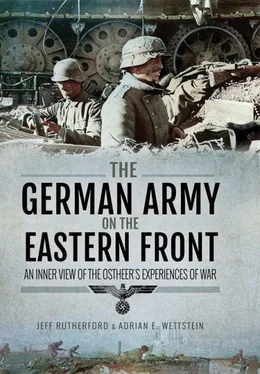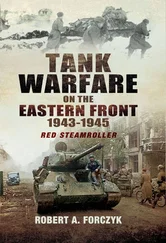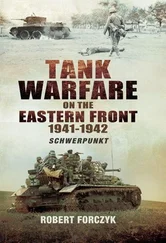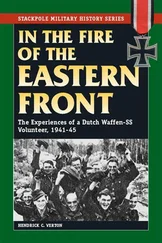Infanterie-Regiment 407/Ia, Erfahrungen über die russ. Führung und Kampfesweise während des Ostfeldzuges, 1.3.1942, BA-MA RH 26-121/18.
205. Infanterie-Division/Ic, Betr.: Fronturlauberheim, o.D. (Entwurf), BA-MA RH 205-26/31.
7. Infanterie-Division/Ia, Betr.: Errichtung von Erholungsheim, 19.2.1942, NARA T-315, Roll 382.
8. Panzer-Division Tätigkeitsbericht Abt Ic, 1.10.42-30.4.43, NARA T-315, Roll 497.
Förster, ‘Geistige Kriegsführung in Deutschland 1919 bis 1945,’ p. 560.
Rutherford, Combat and Genocide on the Eastern Front , pp. 346-354.
126. Infanterie Division/Kommandeur, 30.1.1943, BA-MA RH 26-126/94.
The last section of this sentence is drawn from Johann Wolfgang von Goethe’s, poem Feiger Gedanken (Cowardly Thoughts).
For more on how German soldiers responded to the ‘positive’ aspects of Nazi propaganda, see Stephen Fritz, Frontsoldaten: The German Soldier in World War II .
H. S. to his wife, 31.01.1943, MfK, 3.2002.1214.
H. R. to his wife, 11.03.1943, MfK, 3.2002.0985.
H. S. to his sister, 18.8.1943, MfK 3.2002.0827.
Volker Berghahn, ‘NSDAP und “Geistige Führung der Wehrmacht,”’ in Vierteljahresheft für Zeitgeschichte , Jahrgang 17 (1969), vol. 1, pp. 17-71; here p. 37. See also Förster, ‘Motivation and Indoctrination in the Wehrmacht,’ in Paul Addison and Angus Calder (eds.), Time to Kill , pp 263-73; here, p. 271.
Rass, “ Menschenmaterial ”, 316.
8. Panzer-Division/DBO, 31.10.1943, NARA T-315, Roll 505.
W. P. to his wife, 01.02.1943, MfK, 3.2013.355. It should be noted that this officer was never deployed to the Eastern front. His enthusiastic acceptance of the Nazi programme, however, was typical for large numbers of German soldiers.
126. Infanterie-Division/Ic/DBO, Arbeitsbericht des Divisions-Betreuungs-Offiziers, Berichtzeit: 15.9.-14.10.43, 14.10.1943, BA-MA RH 26-126/130.
This German film combined Nazi ideological ideas about pastoral life with fantasy elements, offering German soldiers some escape from the rigours of the front.
This issue became an increasingly worrisome one for the Nazi leadership, which feared that relationships between German soldiers and Soviet women would inevitably result in ‘inferior’ children. For more on this topic, see Regina Mühlhäuser, Eroberungen: Sexuelle Gewalttaten und intime Beziehungen deutscher Soldaten in der Sowjetunion 1941-1945 .
8. Panzer-Division/DBO, Tätigkeitsbericht des Divisionsbetreuungsoffiziers für die Zeit vom 1.4. bis 30.6.1943, 30.6.1943, NARA T-315, Roll 505.
Shepherd, Hitler’s Soldiers , p. 384.
Rass, “ Menschenmaterial ”, p. 191.
8. Panzer-Division/III.,Tätigkeitsbericht der Abt. III für die Zeit vom 1.1. bis 30.6.1942, 30.6.1942, NARA T-315, Roll 491.
205. Infanterie-Division/Kommandeur, ohne Titel, o.D. [1942], BA-MA RH 26-205/32.
8. Panzer Division/Ic, Betr.: Ic-Angelegenheiten, 29.10.1942, NARA T-315, Roll 497.
Wehrunwürdikeit translates as ‘ineligibility for military service’. Since military service was regarded as an honourable service to the Fatherland, groups that were prosecuted by the Nazi regime, such as homosexuals, Jews and Jehovah’s witnesses were excluded from military service, which was a form of discrimination. Criminals sent to prison also lost their right to serve, but they could regain it by serving in so-called Bewährungeinheiten, or probation units.
Bürgerliche Ehrenrechte translates as ‘civil honours right’. This included, for example, the qualification to hold office.
83. Infanterie-Division/III., Tätigkeitsbericht des Gerichtes der 83. Inf.-Division für die Monate August und September 1942, 4.10.1942, BA-MA RH 26-83/69.
See Rass, “ Menschenmaterial ”, pp. 180-1 for a discussion of this issue as it relates to the 253rd Infantry Division.
Ian Kershaw, The End: The Defiance and Destruction of Hitler’s Germany, 1944-1945 (New York), p. 50.
XIX. (Geb.) Armeekorps/Kommandierender General, Sonderbefehl Kommandierender General Nr. 10, 1.2.1943, NARA T-315, Roll 505.
The Wehrmachtberichte , or Armed Forces Reports, were daily summaries of military events that were framed in such a positive way, that they were viewed as having a great propaganda value by the regime.
The XIXth Mountain Corps was stationed in Lapland, a relatively quiet front in February 1943.
General was combined with the branch, i.e. General der Infanterie , der Artillerie , and so on.
Oberfähnrich were already wearing officers’ insignia, such as officers’ uniforms and caps.
Note that the artillery and the cavalry used the rank name Wachtmeister instead of Feldwebel for all NCO ranks.
Note that this rank was different according to the arm: in the infantry it was Schütze and from 1942 on Grenadier (riflemen), in the artillery Kanonier (gunner), in the cavalry Reiter (horsemen) and so on.






![John Stieber - Against the Odds - Survival on the Russian Front 1944-1945 [2nd Edition]](/books/405234/john-stieber-against-the-odds-survival-on-the-russian-front-1944-1945-2nd-edition-thumb.webp)





